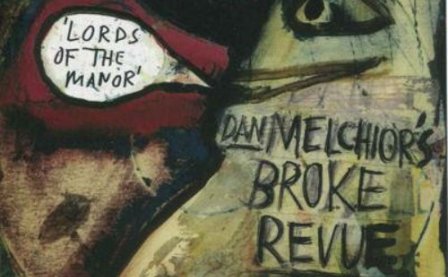I’d like to start this review by reblogging Nathan Shaffer’s far more punctual review of Dan Melchior’s The Backward Path, which actually came out after Excerpts and Half-Speeds. At the time that Kye released Excerpts and Half-Speeds, it was hard to know exactly what to make of it; it had a weirdly literal title that sounded like a B-sides compilation, featured fractured non-songs without lyrics, was far more immersed in sonics than past work, and a few staffers who really like Bill Baird and Graham Lambkin sang its praises. I was just coming off Melchior’s spectacular one-two punch in 2011, Assemblage Blues and King of Sheep, which as a pair nailed succinct, deconstructed rock like a more abrasive Tall Dwarfs or maybe what Robert Pollard might be doing now if his creative momentum matched his output. With Excerpts, I was prepared to be faintly critical that a guy who was on a certain songwriting precipice, willing to let acoustic barres curve around whatever gurgle his machines produced or to let ridiculous distorted flangers stand stark in the middle of his songs — not to mention a guy whose cockney sneer with sprinklings of Mark E. Smith, Daren Harris, and a hilarious, ever-festering resentment of others rendered his personality and presence singular — had submitted to attempt something wholly abstract, detached, almost academic.
These have been described as “songs missing their middles,” but early on, it seemed more a matter of packaging and framing, “the names we give to things,” than process. (Assemblage Blues’ opening track, “Atomizer,” was a song — rather than an avant-garde spoken word piece over a mess of distorted noodling and an unceasing loop — because Melchior gestured at it as such: an octave-shift in the loop and a little lyrical repetition was all it took.) As such, none within the frustrating density of ideas on Excerpts and Half-Speeds sounded that far from becoming a song itself. To make matters even less copacetic, Melchior’s twisted persona seemed to constantly butt its head into the soundscape: right off, it’s his nasal “ahhs” layering in an unending cluster over sputtering raspberries and claves, cool as hell but also not too far from what I produced the day I bought my looping pedal. For such an apparently free-floating ideational endeavor, it was fraught, and if one smells the old venom — “It always makes me laugh to hear you pontificate,” he told the King of Sheep — one can never know which way it’s pointing or whether there’s a target at all.
But it all makes more sense in light (in the dark?) of The Backward Path. If Melchior’s resentment on past work was cartoonish and pointed (“young kids have been playing some game or other, lost in their imaginations… the hideous brats… if only I could inherit a large sum of money I could feel guilty like this for the rest of my life”), the angelic choirs on his most recent record beckon his resentment to dissipate outward into the universal. As such, his fairly familiar bile about “The Old Future” that he had read about in a children’s book swivels away from people, technology, consumerism, and the particular myths thereof towards the vaster disappointments of time. The uncommonly steady “S.P” interstices on that album are the logical extension of both the content-flush of Excerpts and Half-Speeds and his statement of purpose: Melchior has known the emptiness. I see him hollow-eyed, staring out the window at the browning conifers, slowly twisting a knob on his synthesizer. Only occasionally a bluesy indulgence atop. We are “made nervous by its lack of jokes.”
What’s wonderful about Excerpts and Half-Speeds, besides the fact that a lot of it can be digested as simply an extraordinary, cobbled set of ventures into sheer sound with neither affective referent nor the limitations of a somber or academic tone (check “New Golem,” a guitar piece so insistently off-kilter-yet-concordant that it could be an R. Stevie Moore instrumental), is the sense of redemption that those who feel they know Melchior might get when, as on the shuffling loops and pianos of “Done With Thingy” or the crescendo at the end of “Dogwood Sodium Green,” he finds something achingly beautiful or powerful and does not feel inclined to question it. The jagged specificities of his humor and personality ultimately shift from being an obstruction of the experience to being a powerful gravity against the submission the listener witnesses. The uplift is akin to reconciling that when Melchior smirks at the guy weeping on his knees in the night, asking if the circle will remain unbroken, he’s actually smirking at the human race and, by extension — or perhaps in the first place — himself.
More about: Dan Melchior




